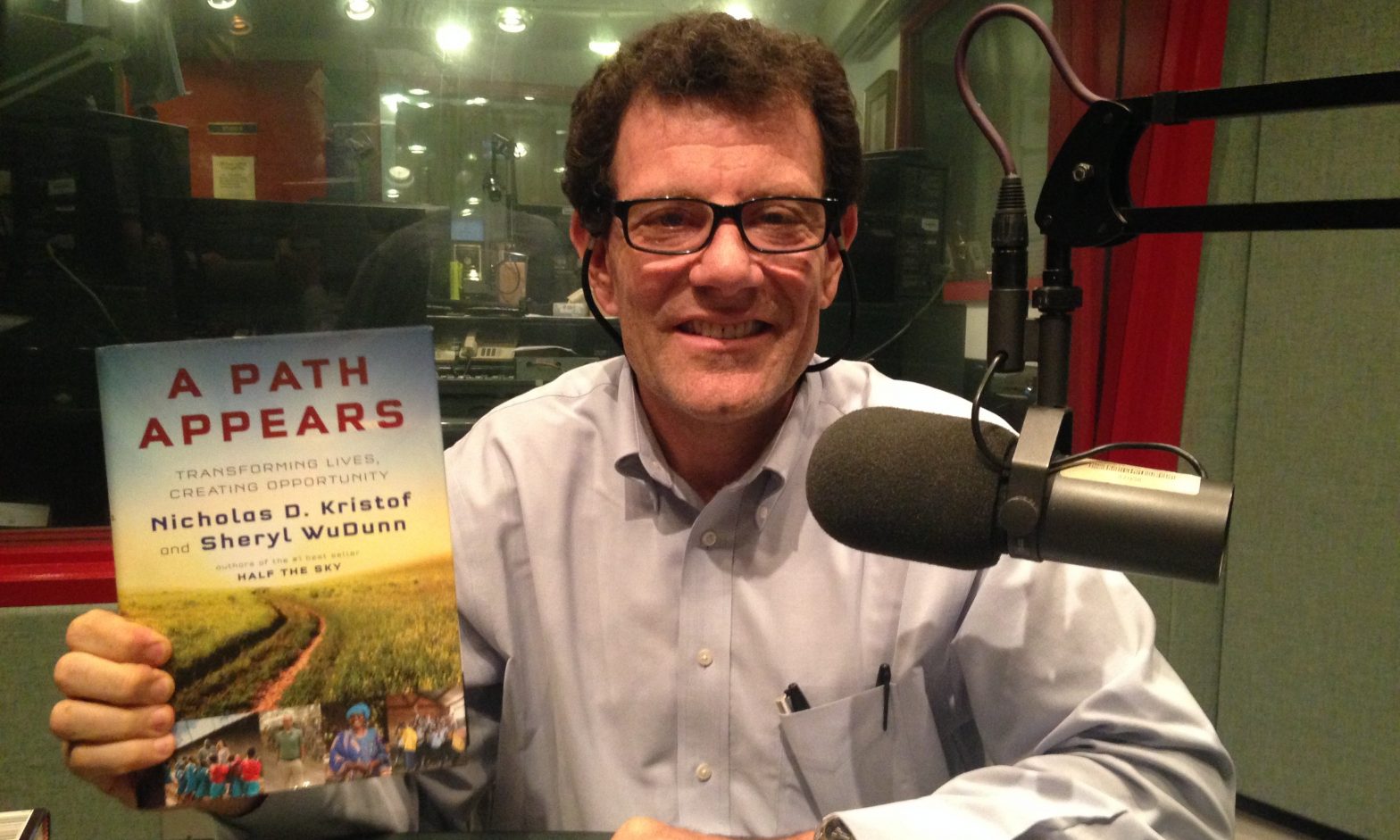When Nicholas Kristof visited the Yale Law School this past Tuesday, he spoke with humility and sincerity that made it seem like he was chatting one on one over coffee, rather than speaking before a packed lecture hall. In conjunction with the Poytner Fellowship in Journalism, the Yale Journalism Initiative, the Yale Globalist, and the Orville H. Schell, Jr. Center for International Human Rights, Kristof introduced the new book he co-wrote with his wife, Sheryl WuDunn: A Path Appears: Transforming Lives, Creating Opportunity. Kristof spoke candidly about today’s challenges, including education, terrorism, and even the future of journalism. Nonetheless, Kristof managed to keep the entire audience laughing and engaged, clearly a mark of an impressive storytelling ability that extends beyond a newspaper column.
Kristof, a well-seasoned traveler of over 150 countries (just before this speaking engagement he was “running around in Cairo”), opened by highlighting the need for students to get out of their comfort zones, be it by traveling abroad or even exploring our local communities, such as New Haven. He pressed universities to invest more money into international experiences and encourage students to take gap years, much like the Princeton Bridge Year Program. Acknowledging that it was not easy, but necessary, Kristof credits his study abroad in Cairo, where he learned Arabic, for really shaping how he sees the world today. Exposure to new situations is crucial. He noted that the wealthiest 20 percent donate less to charity than the poorest 20 percent, not because the wealthy are inherently stingy, but because they are so isolated from poverty that it is harder to empathize.
Kristof sprinkled hilarious personal anecdotes throughout the speech. For example, during his time abroad as a student, he tried introducing himself in Arabic as “Nick.” Much to his dismay, Nick was also a profanity in Arabic. In another episode, his daughter, while examining gangs in Latin America with him, complained that most families travel to the Caribbean for vacation. In response, they travelled to the Caribbean the following year — to study the cholera outbreak in Haiti.
Kristof’s new book, a follow up to 2009’s Half the Sky, reflects this do-good attitude. A Path Appears focuses on what can be done, regardless of resources, to address domestic and international challenges. Even though these issues, such as poverty, seem way too big to handle, he highlighted the tremendous innovation that has occurred in the field, such as Randomized Control Trials (RCTs) to actually measure the success of programs and find highly effective, yet cost-efficient, solutions. For instance, RCTs have revealed that expensive construction programs to build schools are actually less successful than simple deworming campaigns.
After these brief remarks, Kristof opened the floor to questions that primarily focused on the future of journalism, reflecting the high number of future journalists in the room. He reiterated that journalism is in the “lighting business,” and tasked with shining light onto neglected issues. The collapsing business model, however, makes this task even more challenging. Instead, many journalists are doing more “heating,” just trying to stir the pot, but not add anything to it. To stay appealing to mass audiences, journalist must find a way to connect with more people, such as stressing the financial burden of social programs, instead of the equity argument. Even though mass incarceration is one of the most disastrous social issues in America, many conservative states, such as Texas, have reversed these policies simply because they are just too expensive. Another simple phrasing technique is stressing “opportunity” rather than “inequality.”
Lastly, Kristof addressed the future of journalism and creative marketing strategies that must be adapted to meet current demand. In the marketing of Half the Sky, Kristof was initially nervous to use celebrities as part of his message. But he eventually partnered with high-profile individuals, such as Olivia Wilde and Gabrielle Union, to expose his worthy cause to new markets. Ultimately, humanitarian organizations must rethink how they market their information, because if they could create marketing strategies as innovative as those of commercial industries, it could have a profound impact.
Finally, Kristof challenged the way journalist present information, because even emotional stories fail to spark that same response once written. Kristof cited his own frustration when reporting in Darfur, which failed to resonate with public, while on the other hand a story of homeless hawks in New York City captured the attention of the entire city. Offering his own advice, he criticized journalists for too often using numbers and statistics that are actually proven to make people less empathetic. Instead, Kristof uses personal stories to open pathways to people’s emotions.
Today, Kristof said, “Our generation has a promiscuous relationship with news.” To combat this, Kristof has released his New York Times column for free on his blog, in hopes that it can be a “gateway drug” to get people hooked on the publication and build a strong readership. Tuesday’s speech really highlighted journalism’s transition period. In a room full of aspiring reporters, Kristof balanced recounting his own experiences with predicting where future generations must pick up. Hopefully, some of his advice will stick.

